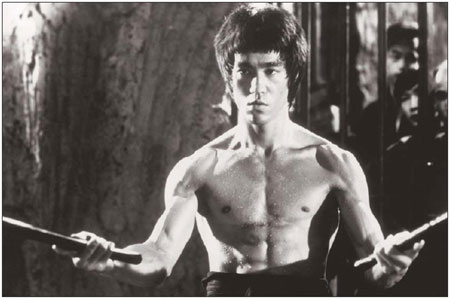Society
Dragon's Heart: A kungfu master's living legacy
By Han Bingbin and Liu Wei (China Daily)
Updated: 2010-12-19 10:26
 |
Large Medium Small |
Another Bruce Lee fan was Chairman Mao Zedong, who watched three of his films repeatedly after Liu Qingtang, then vice-president of the Ministry of Culture in 1974, found copies. According to Liu's memoirs published in Yangcheng Evening News, Mao would clap while watching the films and exclaim: "Good kungfu, good hit!"
 |
|
Bruce Lee: The Little Dragon preached freedom of style in Jeet Kune Do, the school of martial arts he founded. [Provided to China Daily] |
In the 1970s, China was closed and marginalized on the global stage. Overseas Chinese were shamed by the parochial image and Lee and his invincible roles provided an outlet for their ethnic pride, according to Zhang Yiwu, culture critic and a professor at the Peking University.
Zhu Dake, professor at the institute of cultural criticism at Tongji University in Shanghai, agrees. At that time, Lee's strength on screen was a shot in the arm in the doldrums of economic inferiority.
"The fact that Lee was an overseas Chinese could not have stopped the massive hero-worship. To the contrary, it actually intensified the adulation because being an overseas Chinese meant you were on the frontline in combating 'foreigners'," Zhu says.
But, Zhu notes that Lee was never a symbol of nationalism. What he expressed through his films and his Jeet Kune Do practice were universal values of dignity, freedom, equality and justice.
To columnist and film critic Xiao Fei, Lee was more than just brawn. He had brains as well, and his profound influence is a result of not just his charisma on screen but also because he was a thinker.
"He was first and foremost a wise man with a free will, before he was a martial artist," says Xiao. Under the tutelage of Ip Man, his master in Hong Kong, Bruce Lee understood that martial arts was about control of the mind.
His understanding was enhanced by his study of eastern and western philosophy in his college years in the US.
In his 20s, Bruce Lee was already questioning, and eager to break the barriers between the different schools of martial arts.
"Lee described Jeet Kune Do as a 'style with no style', or in his words, 'formless and shapeless like water'. Water can take any shape, depending on the vessel that contains it. Lee believed martial arts should be as fluid as water.
"For Lee, it was a system of learning and thinking, pursuing freedom of heart and wisdom and eschewing the obsession with dazzling moves. We may not have his talent, but we can own the independence of soul and freedom of thinking as he advocates," Xiao says.
Sometimes, the creation takes on a life of its own.
There is now a new style of calligraphy called "Jeet Kune Do" created by a calligrapher in Xinjiang.
And a new marketing theory follows the principles of Jeet Kune Do, just as Sun zi's Art of War has been adopted as a marketing bible.
We won't even tell you about the restaurant and the line of electronic goods from Japan.